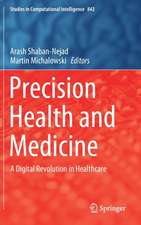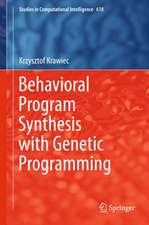Foundations of Biomedical Knowledge Representation: Methods and Applications: Lecture Notes in Computer Science, cartea 9521
Editat de Arjen Hommersom, Peter J.F. Lucasen Limba Engleză Paperback – 3 feb 2016
Eventhough there are huge differences in the techniques and methods used bybiomedical researchers, there is now an increasing tendency to share researchresults in terms of formal knowledge representation methods, such asontologies, statistical models, network models, and mathematical models. Asthere is an urgent need for health-care professionals to make better decisions,computer-based support using this knowledge is now becoming increasingly important.It may also be the only way to integrate research results from the differentparts of the spectrum of biomedical and clinical research.
Theaim of this book is to shed light on developments in knowledge representationat different levels of biomedical application, ranging from human biology toclinical guidelines, and using different techniques, from probability theoryand differential equations to logic. The book starts with two introductorychapters followed by 18 contributions organized in the following topicalsections: diagnosis of disease; monitoring of health and disease andconformance; assessment of health and personalization; prediction and prognosisof health and disease; treatment of disease; and recommendations.
Din seria Lecture Notes in Computer Science
- 20%
 Preț: 1061.55 lei
Preț: 1061.55 lei - 20%
 Preț: 307.71 lei
Preț: 307.71 lei - 20%
 Preț: 438.69 lei
Preț: 438.69 lei - 20%
 Preț: 645.28 lei
Preț: 645.28 lei -
 Preț: 410.88 lei
Preț: 410.88 lei - 15%
 Preț: 580.46 lei
Preț: 580.46 lei - 17%
 Preț: 427.22 lei
Preț: 427.22 lei - 20%
 Preț: 596.46 lei
Preț: 596.46 lei -
 Preț: 449.57 lei
Preț: 449.57 lei - 20%
 Preț: 353.50 lei
Preț: 353.50 lei - 20%
 Preț: 1414.79 lei
Preț: 1414.79 lei - 20%
 Preț: 309.90 lei
Preț: 309.90 lei - 20%
 Preț: 583.40 lei
Preț: 583.40 lei - 20%
 Preț: 1075.26 lei
Preț: 1075.26 lei - 20%
 Preț: 310.26 lei
Preț: 310.26 lei - 20%
 Preț: 655.02 lei
Preț: 655.02 lei - 20%
 Preț: 580.93 lei
Preț: 580.93 lei - 20%
 Preț: 340.32 lei
Preț: 340.32 lei - 18%
 Preț: 938.83 lei
Preț: 938.83 lei - 20%
 Preț: 591.51 lei
Preț: 591.51 lei - 15%
 Preț: 438.59 lei
Preț: 438.59 lei - 20%
 Preț: 337.00 lei
Preț: 337.00 lei -
 Preț: 389.48 lei
Preț: 389.48 lei - 20%
 Preț: 607.39 lei
Preț: 607.39 lei - 20%
 Preț: 1024.44 lei
Preț: 1024.44 lei - 20%
 Preț: 579.30 lei
Preț: 579.30 lei - 20%
 Preț: 763.23 lei
Preț: 763.23 lei - 20%
 Preț: 453.32 lei
Preț: 453.32 lei - 20%
 Preț: 575.48 lei
Preț: 575.48 lei - 20%
 Preț: 585.88 lei
Preț: 585.88 lei - 20%
 Preț: 825.93 lei
Preț: 825.93 lei - 20%
 Preț: 763.23 lei
Preț: 763.23 lei - 17%
 Preț: 360.19 lei
Preț: 360.19 lei - 20%
 Preț: 1183.14 lei
Preț: 1183.14 lei - 20%
 Preț: 340.32 lei
Preț: 340.32 lei - 20%
 Preț: 504.57 lei
Preț: 504.57 lei - 20%
 Preț: 369.12 lei
Preț: 369.12 lei - 20%
 Preț: 583.40 lei
Preț: 583.40 lei - 20%
 Preț: 343.62 lei
Preț: 343.62 lei - 20%
 Preț: 350.21 lei
Preț: 350.21 lei - 20%
 Preț: 764.89 lei
Preț: 764.89 lei - 20%
 Preț: 583.40 lei
Preț: 583.40 lei - 20%
 Preț: 649.49 lei
Preț: 649.49 lei - 20%
 Preț: 341.95 lei
Preț: 341.95 lei - 20%
 Preț: 238.01 lei
Preț: 238.01 lei - 20%
 Preț: 538.29 lei
Preț: 538.29 lei
Preț: 335.18 lei
Preț vechi: 418.98 lei
-20% Nou
Puncte Express: 503
Preț estimativ în valută:
64.13€ • 67.14$ • 53.07£
64.13€ • 67.14$ • 53.07£
Carte tipărită la comandă
Livrare economică 05-19 aprilie
Preluare comenzi: 021 569.72.76
Specificații
ISBN-13: 9783319280066
ISBN-10: 3319280066
Pagini: 339
Ilustrații: XII, 339 p. 92 illus. in color.
Dimensiuni: 155 x 235 x 19 mm
Greutate: 0.49 kg
Ediția:1st ed. 2015
Editura: Springer International Publishing
Colecția Springer
Seriile Lecture Notes in Computer Science, Lecture Notes in Artificial Intelligence
Locul publicării:Cham, Switzerland
ISBN-10: 3319280066
Pagini: 339
Ilustrații: XII, 339 p. 92 illus. in color.
Dimensiuni: 155 x 235 x 19 mm
Greutate: 0.49 kg
Ediția:1st ed. 2015
Editura: Springer International Publishing
Colecția Springer
Seriile Lecture Notes in Computer Science, Lecture Notes in Artificial Intelligence
Locul publicării:Cham, Switzerland
Public țintă
ResearchCuprins
Howto Read the Book “Foundations of Biomedical Knowledge Representation”.- AnIntroduction to Knowledge Representation and Reasoning in Healthcare.- Representing Knowledge forClinical Diagnostic Reasoning.- Automated Diagnosis of Breast Cancer onMedical.- Monitoring in the Healthcare Setting.- Conformance Verification ofClinical Guidelines in Presence of Computerized and Human-Enhanced.- Modelling and Monitoringthe Individual Patient in Real Time.- Personalised Medicine: Taking a New Lookat the Patient.- Graphical Modelling in Genetics and Systems Biology.- ChainGraphs and Gene Networks.- Prediction and Prognosis of Health and Disease.- TrajectoriesThrough the Disease Process: Cross Sectional andLongitudinal Studies.- Dynamic Bayesian Network forCervical Cancer Screening.- Modeling Dynamic Processes with Memory by HigherOrder TemporalModels.- Treatment of Disease: The Role of Knowledge Representation forTreatment Selection.- Predicting Adverse Drug Events from Electronic MedicalRecords.- User Modelling for Patient Tailored Virtual Rehabilitation.- SupportingPhysicians and Patients through Recommendation: Guidelines and Beyond.- AHybrid Approach to the Verification of Computer Interpretable Guidelines.- Aggregation of ClinicalEvidence Using Argumentation.
Textul de pe ultima copertă
Medicine and health care are currently faced with a significant rise in their complexity. This is partly due to the progress made during the past three decades in the fundamental biological understanding of the causes of health and disease at the molecular, (sub)cellular, and organ level. Since the end of the 1970s, when knowledge representation and reasoning in the biomedical field became a separate area of research, huge progress has been made in the development of methods and tools that are finally able to impact on the way medicine is being practiced.
Even though there are huge differences in the techniques and methods used by biomedical researchers, there is now an increasing tendency to share research results in terms of formal knowledge representation methods, such as ontologies, statistical models, network models, and mathematical models. As there is an urgent need for health-care professionals to make better decisions, computer-based support using this knowledge is now becoming increasingly important. It may also be the only way to integrate research results from the different parts of the spectrum of biomedical and clinical research.
The aim of this book is to shed light on developments in knowledge representation at different levels of biomedical application, ranging from human biology to clinical guidelines, and using different techniques, from probability theory and differential equations to logic. The book starts with two introductory chapters followed by 18 contributions organized in the following topical sections: diagnosis of disease; monitoring of health and disease and conformance; assessment of health and personalization; prediction and prognosis of health and disease; treatment of disease; and recommendations.
Even though there are huge differences in the techniques and methods used by biomedical researchers, there is now an increasing tendency to share research results in terms of formal knowledge representation methods, such as ontologies, statistical models, network models, and mathematical models. As there is an urgent need for health-care professionals to make better decisions, computer-based support using this knowledge is now becoming increasingly important. It may also be the only way to integrate research results from the different parts of the spectrum of biomedical and clinical research.
The aim of this book is to shed light on developments in knowledge representation at different levels of biomedical application, ranging from human biology to clinical guidelines, and using different techniques, from probability theory and differential equations to logic. The book starts with two introductory chapters followed by 18 contributions organized in the following topical sections: diagnosis of disease; monitoring of health and disease and conformance; assessment of health and personalization; prediction and prognosis of health and disease; treatment of disease; and recommendations.
Caracteristici
State-of-the-art research Written by experts Provides an overview of the developments in knowledge representation Includes supplementary material: sn.pub/extras





























